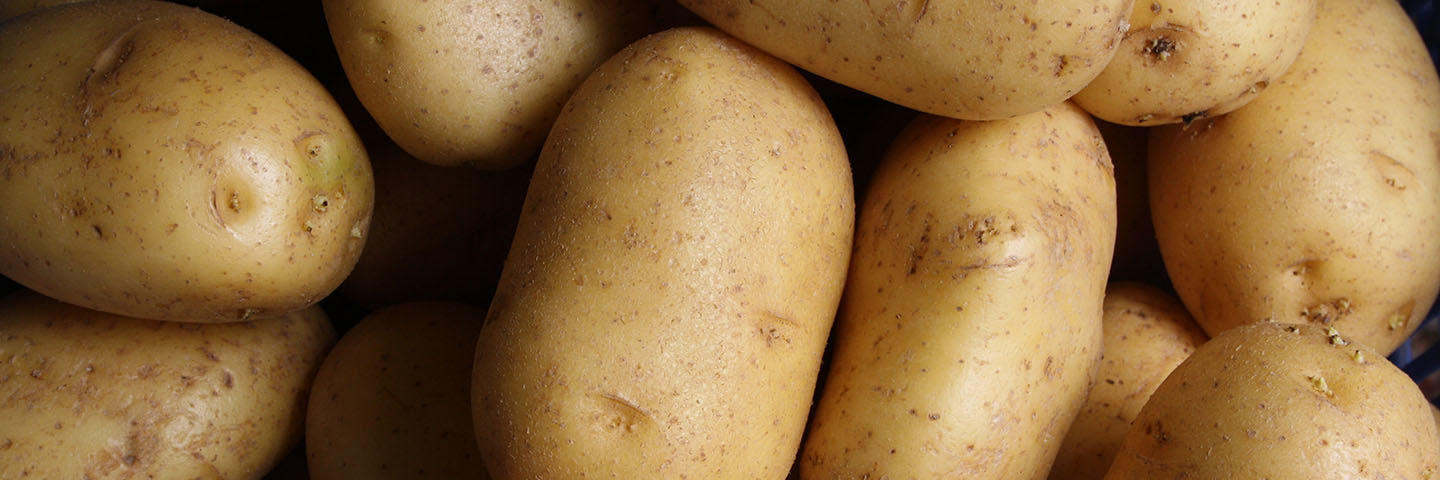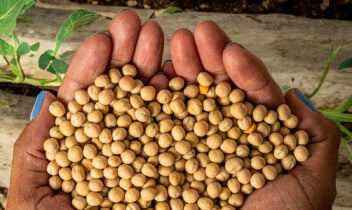
Potato
SELECT
Potatoes are available fresh, frozen and canned for good nutrition and convenience. If selecting fresh, look for clean, smooth, firm-textured potatoes with no cuts, bruises or discoloration.
Varieties to Explore
Fingerling Potato
Purple Potato
Red Potato
Yellow Potato
Russet Potato
White Potato
Petite Potato
Nutrient Content Claims
Excellent source of vitamin C, Good source of potassium, Sodium and Cholesterol free, Good source of vitamin B6, Fat-free
Health Claims
Diets low in sodium may reduce the risk of high blood pressure, a disease associated with many factors. Potatoes are sodium free.
Diets low in sodium may reduce the risk of high blood pressure. Potatoes are sodium free.
While many factors affect heart disease, diets low in saturated fat and cholesterol may reduce the risk of this disease. Potatoes contain no saturated fat or cholesterol.
Low fat diets rich in fruits and vegetables (foods that are low in fat and may contain dietary fiber, vitamin A, or vitamin C) may reduce the risk of some types of cancer, a disease associated with many factors. Potatoes are an excellent source of vitamin C.
Reference: Potatoes, Nutrition & Health White Paper
STORE
Store potatoes in a cool, well-ventilated place. Colder temperatures lower than 50 degrees, such as in the refrigerator, cause a potato’s starch to convert to sugar, resulting in a sweet taste and discoloration when cooked.
If you do refrigerate, letting the potato warm gradually to room temperature before cooking can reduce the discoloration.
Avoid areas that reach high temperatures (beneath the sink or beside large appliances) or receive too much sunlight (on the countertop).
Perforated plastic bags and paper bags offer the best environment for extending shelf-life. Keep potatoes out of the light. Don’t wash potatoes before storing. Dampness promotes early spoilage.
SERVE
Check out our potato recipes!
SAVOR
Presence in Ethnic Cuisines
Chinese, Japanese, Korean / African / Latino / Mexican / Mediterranean / Cajun, Creole
SHARE
Social Media Posts
#DYK In October 1995, the potato became the first vegetable to be grown in space? @fruitsandveggies #haveaplant
Potatoes are an excellent source of vitamin C (30% of the DV) which is more than one medium tomato or sweet potato. @fruitsandveggies #haveaplant
From weekend warrior or elite athlete, there’s a potato option (and potato type) for every performance lifestyle! @fruitsandveggies #haveaplant
SCORE! For less than $20, you can feed your family of four this delicious n nutritious Yellow Potato n Red Pepper Shrimp Sauté: http://ow.ly/r60oT
Fix that Mexican food craving w/ these Chili & Lime Chicken Potato Tacos! A trip across the border for a fraction of the cost: http://ow.ly/s9P5K
Common Consumer Questions
Are all varieties of potatoes equally nutritious?
All varieties of potatoes are nutritious and, while both the type and amounts of nutrients may vary slightly depending on the variety, the differences are minimal. So minimal in fact, the FDA nutrition label for potatoes represents a composite of varietals (“market-basket approach”) based on typical US consumption patterns (i.e., 70% Russet, 18% white and 12% reds). Based on the FDA label the following claims can be made for the potato:
An excellent source (> 20% of the DV) of vitamin C
A good source (>10% of the DV) of potassium
A good source (> 10% of the DV) of vitamin B6
Low in sodium (< 140 mg/serving) and cholesterol
Fat free (< .5 g fat/serving)
Contains 3 grams of fiber with the skin
If you peel potatoes, do they lose all nutrients?
No. The notion that all of the nutrients are found in the skin is a myth. While the skin does contain approximately half of the total dietary fiber, the majority (> 50%) of the nutrients are found within the potato itself.
Are sweet potatoes more nutritious than white potatoes? There’s a common misperception is that sweet potatoes are far healthier than potatoes. But gram for gram, both vegetables should consider themselves in good company. They are very similar in nutrient content for fiber, protein, vitamin B6 and iron; however, potatoes contain far more vitamin C and potassium, whereas sweet potatoes tout their beta carotene and calcium.


